Daily Online Journal for Tunis 2005 - Sept 3, 2005Day 1 || Day 2 || Day 3 || Day 3 Symposium || Day 4 || Days Before & After TUNIS 2005 || Home Day 3 - Saturday September 3, 2005 Day three of the African Junior Championships began with much anticipation since there would be a forum to discuss training possibilities for young athletes. There were scheduled presentations by the DeKalb International Training Center as well as representation of IAAF Centers in Senegal, Egypt, Mauritius, Kenya and Algeria, Morocco and Tunisia, as identified training centers for young athletes. Abdel Malek El-Hebil, the Senior Manager for the IAAF Member Service Department under which Accredited Training Center fall, detailed his plan outlining the various training centers such as Regional Training centers, Accredited Training Centers and High Performance Training Centers. The symposium led off with some fiery challenges by Tunisian president General Chetali and was followed by opening statements by African Athletics President Colonel Kalkaba. The symposium took a bit of a turn when Dr. Marc Daniel Gutekunst of the DITC graciously split his time as a translator and presenter. Mr. Malek began the symposium by defining the differences of 9 Regional Training Centers, 7 High Performance Training Centers and finally Accredited Training Centers. Mr. Malek laid out the finances for federations to send their athletes to a High Performance Training Center. Every system has strengths and weaknesses and coming from a different system it seems that the HPC's are underutilized with Dakar having 16 athletes, Morocco 5, Mauritius 0 and Kenya 1, for a total of 22 athletes training. According to Mr. Malek, these high performance centers receive approximately 1.165 million dollars a year. Which breaks down roughly to $166.4 thousand per HPC. So between the 4 training they are receiving $665,600 to train 22 athletes at $30,254 per athlete, which is not unreasonable if these athletes were receiving a quality education. Since inception HPC athletes have received 4 Olympic Medals: 3 Gold Medals and One Bronze. Africa as a continent achieved 23 medals at the 2004 Olympic Games and similarly, 23 medals were taken at World Championships by athletes of Ethiopia, Kenya, Morocco, Uganda, Ghana and Tanzania. Atlanta's DITC, as it referred to, was led by Dr. Marc Daniel Gutekunst. The presentation began with a very good video outlining the benefits of Atlanta's DITC. It was very well received as well as his power point presentation, which had to be abbreviated because of the translating duties that he had to take over. Questions by the 81 or so attendees included one of whether there was adequate medical care at the HPC. One comment was made by Ahmed Enan, in which he explained a process that was utilized for Egyptian Athletes in preparation for the 04 Olympics. Mr. Enan explained that it gave the power of choice to the National Olympic Committee and ultimately the federation. The "Egyptian Model," provides power to choose not only who would receive training but also the power to choose the training center they wanted to send their athletes. In Egypt's case they sent 2 males in athletics and 1 female in swimming, to the DITC. The swimmer ended up participating in the 2004 Olympic Games, Mr. Enan went on to say the athletes mentioned it was the first time they received really professional program and training. It is impossible to judge the situation without my American slant since I have grown up with a different system and I know there are many challenges out there but in my biased opinion there seems to be a real opportunity to utilize all the training centers and develop a coalition of training centers of sorts in order to increase achievement and number of athletes utilizing each center for training, competition and educational opportunities available for each nations athletes. Standards are supposed to be used to maintain the quality of achievement but if there isn't achievement the standards shouldn't be an obstacle to utilization of training centers and coaches There are 53 African Olympic Committees and there are ample athletes out there that need to be identified and systematically trained in order to be the best they can be. I agree there is a question of funding but with some coordination each center whether it's in Atlanta, Dakar, Nairobi, or Cairo just to name a few, each training center can be servicing many more athletes with the ultimate goal of allowing each athlete reach their potential whether it be through IAAF, Olympic Solidarity or alternative means such as the Egyptian Olympic Committee utilizing corporate sponsorship. There are names like: Vénuste Niyongabo, Peter Rono, Maria Mutola, Mohammed Gammoudi, William Tanui, Amadou Dia Ba, Hichiam El Garrouj, Mary Onali, Noureddine Morceli, Francoise Mbango Etone, Enefiok Udo Obong, Kenenisa Bekele, Haile Gebreselessis, Glory Alozie, Julius Sang, Abdoulaye Seye, Meseret Defar, Ejagaehu Dibaba, John Akii Bua, and Kipchoge Keino, to name a few champions. The virtues of sport far out way the costs of sport. Can you afford not to honor the past by creating a strong future for Africa's athletes to achieve? Day 3 Results (French, listed under "3ème Journée") or English version Day 3 Photo Gallery for Tunis 2005 - Sept 3, 2005 |
|
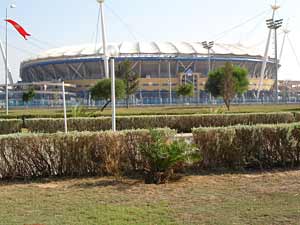 |
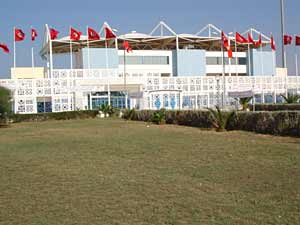 |
November 7 Radès Sports Complex main Stadium (seating capacity of 35,000) |
November 7 Radès Sports Complex small Stadium where TUNIS 2005 was held (seating capacity of 5,000) |
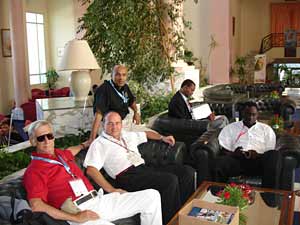 |
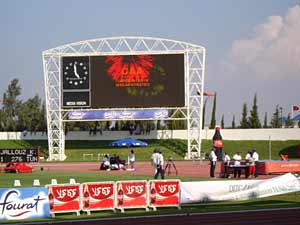 |
At the Phoebus hotel, Team DITC waiting to go to the Stadium |
|
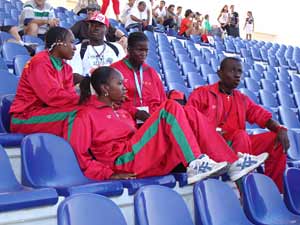 |
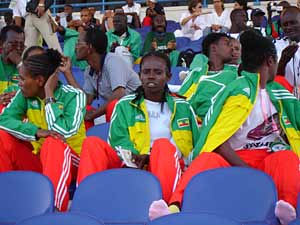 |
Sudanese athletes |
Ethiopian athletes |
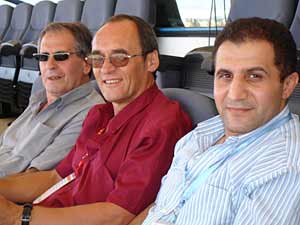 |
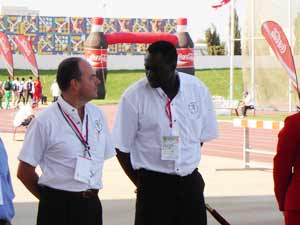 |
Jean-Claude SORGE, Alain SMAIL, Hassène IKHLEF |
Marc Daniel GUTEKUNST and Amadou DIA BA (1988 Olympic Silver Medallist) waiting to award the medals for the 400H |
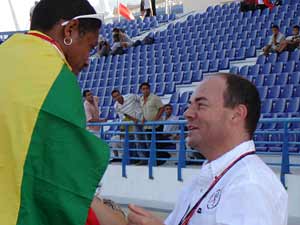 |
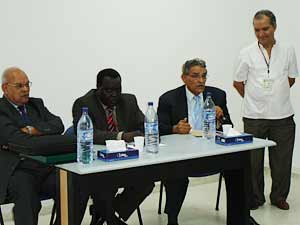 |
And Bronze goes to Ethiopia.. |
Tunis 2005 Press Conference (L to R): Abdessalem IBRAHIM, President, COCAJA, Colonel KALKABA, President, AAC, General Younès CHETALI, and Noureddine HAFSI |
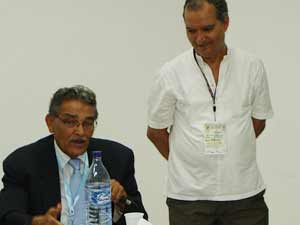 |
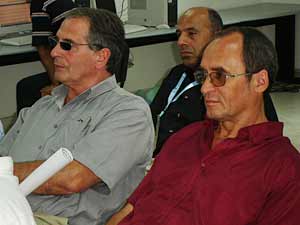 |
Younès CHETALI and Noureddine HAFSI, Director, Marketing & Communication, TUNIS 2005 |
Jean-Claude SORGE, Ahmed ENAN, ALain SMAIL at the TUNIS 2005 Press Conference |
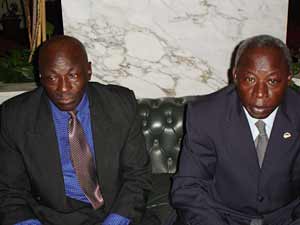 |
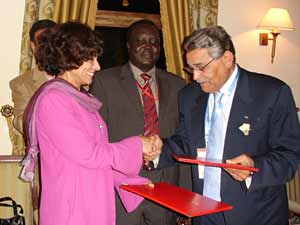 |
Doudou JOOF (Gambia), Honorary Treasurer, AAC, Abdoul Wahab BARKA BA, Secretary General, AAC |
General Younès CHETALI passes on the Torch of the AAC North 1 Zone Presidency from Tunisia to Fatima EL FAQUIR (Morocco) |
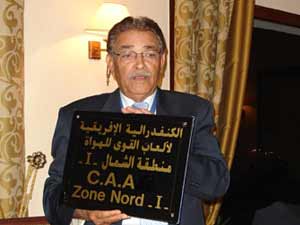 |
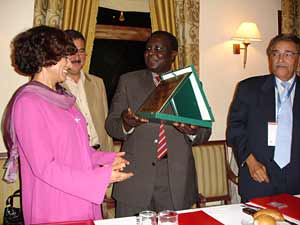 |
General Youès CHETALI holding the AAC North I Zone Plaque before passing it one to Morocco |
Colonel KALKABA passing on the AAC North 1 Zone Plaque to Fatima EL FAQUIR |
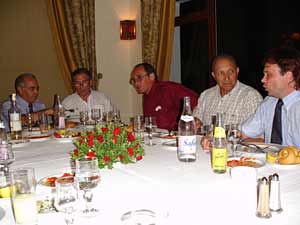 |
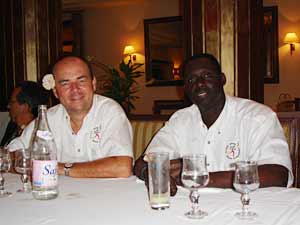 |
|
|
Day 1 || Day 2 || Day 3 || Day 3 Symposium || Day 4 || Days Before & After TUNIS 2005 || Home |
|
